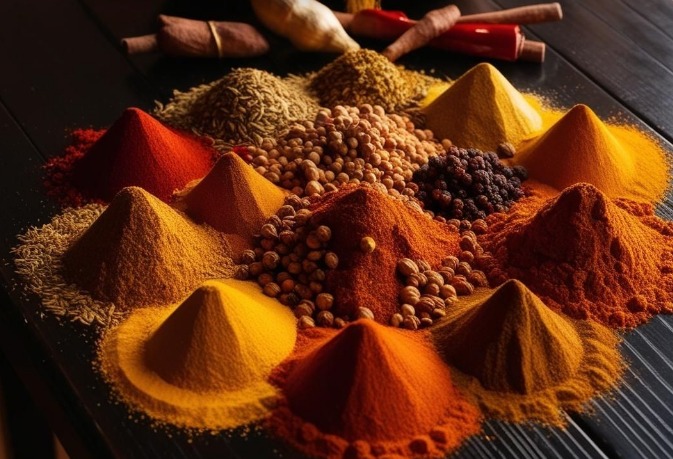No products in the cart.
Spices as Natural Medicine: What Ayurveda and Science Say

For centuries, spices have been more than just flavor enhancers in the kitchen. In Ayurveda—the ancient Indian system of medicine—spices are viewed as powerful healing agents that balance the body, mind, and spirit. Modern science is now uncovering evidence that supports many of these traditional beliefs, highlighting the medicinal potential of everyday spices.
Ayurvedic Perspective on Spices
Ayurveda believes that food is medicine, and spices are its most potent tools. Each spice carries unique properties that influence the body’s doshas (Vata, Pitta, and Kapha). For example
1. Lakadong Turmeric (Haldi): The Golden Healer
Lakadong Turmeric, grown in the pristine hills of Meghalaya, India, is often called the “golden healer” because of its exceptionally high curcumin content (up to 7–12%, compared to 2–3% in regular turmeric). This makes it one of the most potent varieties of turmeric in the world.
In Ayurveda, turmeric is revered as Haridra—a sacred spice that cleanses the body inside out. It is:
- Blood purifier (Rakta Shodhak): Flushes toxins and supports clearer skin.
- Anti-inflammatory (Shothahara): Reduces swelling, joint stiffness, and pain.
- Immunity booster (Ojas vardhak): Enhances body’s resistance against infections.
- Tridoshic balance: Suitable for all body types (Vata, Pitta, Kapha) by improving digestion, circulation, and overall vitality.
🔬 Science Says
Modern research supports Ayurveda’s wisdom, linking turmeric’s health benefits to curcumin, its active compound. Some well-studied benefits include:
- Joint & Bone Health: Curcumin reduces inflammation in arthritis, helping with mobility and stiffness.
- Metabolic Support: May improve insulin sensitivity, balance cholesterol, and reduce risk of metabolic syndrome.
- Brain & Nerve Health: Curcumin boosts brain-derived neurotrophic factor (BDNF), linked to memory, learning, and reduced risk of neurodegenerative conditions.
- Gut & Liver Support: Promotes healthy digestion, protects liver from toxins, and improves bile flow.
- Antioxidant Defense: Neutralizes harmful free radicals, slowing aging and reducing cell damage.
🟢 Try This
- Golden Milk (Haldi Doodh): Warm a glass of milk with half a teaspoon of Lakadong turmeric and a pinch of black pepper (to enhance curcumin absorption). This calming drink supports better sleep, eases joint pain, and strengthens immunity.
- Morning Detox Water: Add turmeric and lemon to warm water for a gentle daily detox.
- Cooking Companion: Use Lakadong turmeric in curries, soups, and teas for both flavor and healing.
💡 Note: For maximum benefits, pair turmeric with black pepper (piperine) or a healthy fat (like ghee or coconut oil) to enhance absorption.

2. Ginger (Adrak): Nature’s Digestive Tonic
In Ayurveda, ginger is honored as Vishvabheshaja, meaning “the universal medicine.” It is considered one of the most versatile healing spices and is often recommended for everyday use. Its benefits include:
- Stimulating digestion by igniting Agni (digestive fire), reducing gas, bloating, and indigestion.
- Relieving nausea and vomiting—commonly prescribed for morning sickness, travel sickness, and post-illness weakness.
- Easing respiratory issues like cough, cold, and congestion due to its warming nature.
- Balancing doshas – Primarily balances Vata and Kapha, while excess use may aggravate Pitta because of its heating quality.
- Improving circulation and energy, making it a natural remedy for fatigue and sluggishness.
Ayurveda often recommends ginger before meals to kindle digestion and improve appetite.
🔬 Science Says
Modern research supports ginger’s long history of medicinal use. Its main bioactive compounds, gingerols and shogaols, are responsible for most of its therapeutic effects:
- Digestive health – Enhances gastric motility and reduces indigestion, bloating, and discomfort.
- Anti-nausea properties – Widely studied for reducing nausea in pregnancy, chemotherapy, and motion sickness.
- Anti-inflammatory effects – May help reduce joint pain and stiffness in osteoarthritis and rheumatoid arthritis.
- Antioxidant power – Protects cells from oxidative stress, which supports immunity and slows aging.
- Metabolic benefits – Helps regulate blood sugar and cholesterol levels, contributing to heart health.
- Immune support – Its warming, antimicrobial action helps fight colds, sore throats, and flu-like symptoms.
Try This
- Ginger Tea: Simmer fresh ginger slices in hot water, add honey and lemon for soothing relief from colds, cough, or indigestion.
- Digestive Aid: Eat a thin slice of fresh ginger with rock salt before meals to boost appetite and digestion.
- For Motion Sickness: Carry dried ginger candies or sip ginger tea during travel.
- Cold Remedy: Mix ginger juice with honey and black pepper for relief from sore throat and congestion.
⚠️ Note: Excess ginger may cause heartburn or acidity in people with high Pitta (heat in the body). Pregnant women should use it in moderation.

3. Black Pepper (Kali Mirch): The King Of Spices
In Ayurveda, black pepper is called Maricha and is considered one of the most potent spices for stimulating Agni (digestive fire). It is often included in Trikatu (a classical blend of black pepper, long pepper, and ginger) used for boosting metabolism and respiratory health. Its key benefits include:
- Enhancing digestion by improving absorption and reducing ama (toxins).
- Clearing respiratory pathways, making it useful in cough, cold, and asthma.
- Balancing doshas – Primarily reduces Kapha (phlegm, heaviness) and Vata, while in excess may aggravate Pitta (heat).
- Improving circulation and energizing the body.
Ayurveda often prescribes black pepper in both food and medicine to sharpen the mind, awaken the senses, and aid detoxification.
🔬 Science Says
Modern science validates black pepper’s role as more than just a seasoning. Its active compound, piperine, has strong bioactive properties:
- Bioavailability booster – Piperine significantly enhances the absorption of nutrients and other herbs, especially curcumin from turmeric.
- Digestive benefits – Stimulates digestive enzymes, reduces bloating, and improves nutrient uptake.
- Respiratory support – Its expectorant and anti-inflammatory properties help in relieving coughs, colds, and sinus congestion.
- Brain and mental health – Research suggests piperine may support cognitive function and protect against neurodegenerative conditions.
- Metabolic health – Studies show black pepper may help regulate cholesterol levels, support fat metabolism, and aid in weight management.
Try This
- Pepper-Turmeric Tonic: Mix a pinch of black pepper with turmeric in warm milk or tea for enhanced absorption of curcumin.
- Pepper Tea for Colds: Boil crushed black pepper with ginger and honey to relieve congestion and sore throat.
- Daily Cooking: Sprinkle freshly ground black pepper on salads, soups, or stir-fries to boost flavor and health.
⚠️ Note: Use black pepper in moderation. Excessive intake can cause gastric irritation or aggravate Pitta imbalance (heat, acidity)..

4. Cinnamon (Dalchini): The Sweet Warming Spice
In Ayurveda, cinnamon is considered a warming spice that stimulates energy and circulation. It is especially beneficial for balancing Kapha and Vata doshas due to its heating and drying qualities. Traditionally, it is used to:
- Kindle digestive fire (Agni), improving appetite and digestion.
- Remove ama (toxins) from the body by enhancing metabolism.
- Support respiratory health, easing cough, cold, and congestion.
- Improve circulation, keeping the body warm in cold seasons.
- Balance blood sugar and reduce sweet cravings naturally.
Because of its pleasant taste and aroma, cinnamon has been used for centuries not only in medicine but also in Ayurveda-inspired beverages like herbal teas and kadhas.
🔬 Science Says
Modern research has uncovered many health-promoting compounds in cinnamon, particularly cinnamaldehyde, cinnamic acid, and procyanidins. Key scientific findings include:
- Blood sugar regulation – Cinnamon helps improve insulin sensitivity, lower fasting blood sugar, and support diabetes management.
- Anti-inflammatory effects – Reduces inflammation and may help with joint pain and muscle soreness.
- Antioxidant powerhouse – Protects cells from oxidative stress, supporting heart and brain health.
- Cholesterol support – Some studies show cinnamon may reduce total cholesterol, LDL (“bad” cholesterol), and triglycerides while raising HDL (“good” cholesterol).
- Antimicrobial properties – Cinnamon inhibits the growth of harmful bacteria and fungi, making it useful for oral health and food preservation.
⚠️ A quick note: Cassia cinnamon (common, inexpensive type) contains higher levels of coumarin, which can be harmful to the liver in large amounts. Ceylon cinnamon (“true cinnamon”) is safer for long-term use.
Try This
Ayurvedic Detox Mix: Combine cinnamon, ginger, and black pepper in warm water for improved metabolism and immunity.
Cinnamon Tea: Boil a small stick of cinnamon in water for 5–7 minutes. Add honey and sip to improve digestion and relieve congestion.
Morning Boost: Sprinkle cinnamon on oatmeal, smoothies, or coffee for blood sugar balance and warmth.

Everyday Use of Spices as Medicine
- Add a pinch of turmeric to warm milk for immunity.
- Sip ginger tea to ease colds, sore throat, and indigestion.
- Sprinkle cinnamon on oatmeal or smoothies for blood sugar balance.
- Chew on fennel seeds after meals for better digestion.
- Use clove oil (diluted) for toothache relief.
⚖️ The Balance Between Tradition and Science
While Ayurveda encourages daily use of spices, modern science reminds us of dosage and safety. For example, high doses of turmeric supplements may affect liver function, and excess cinnamon can be harmful due to coumarin content. The key lies in moderation and culinary use rather than over-supplementation.
🌿 Conclusion
Spices are nature’s pharmacy, blending taste with therapeutic power. Ayurveda has long celebrated them as daily medicine, and science now echoes their benefits with clinical evidence. By mindfully adding these spices to our diets, we not only enrich flavor but also nurture holistic health



